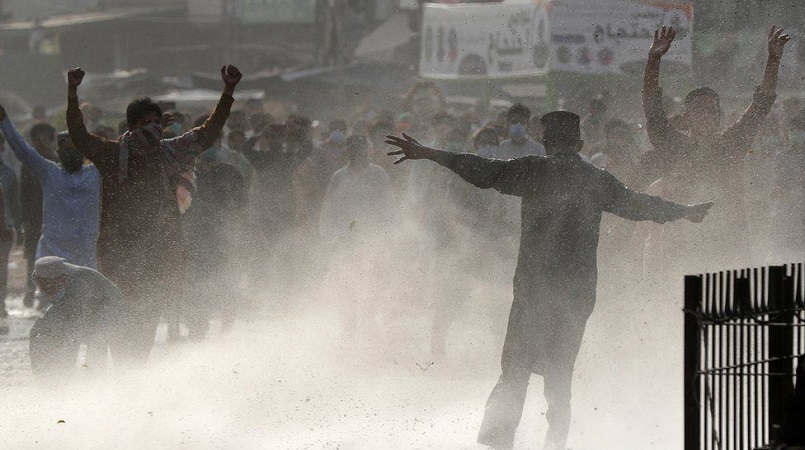
France has urged all its citizens in Pakistan to leave the country temporarily amid violent anti-French protests across the country.
The country's embassy in Pakistan warned of "serious threats to French interests in Pakistan", saying protests were increasing nationwide.
Two police officers died this week in renewed clashes with protesters.
The protests were sparked months ago after France defended the right to show cartoons of the Prophet Muhammad.
In October last year, French President Emmanuel Macron strongly defended freedom of expression after the beheading of a teacher who showed such cartoons during a class discussion.
This prompted anger in parts of the Muslim world, including Pakistan, where there were calls for a boycott of French goods.
Depictions of the Prophet Muhammad are widely regarded as taboo in Islam, and are considered highly offensive by Muslims.
The protests escalated this week after the Pakistani government arrested Saad Hussain Rizvi, leader of the hard-line political party Tehreek-e-Labaik Pakistan (TLP), which has called for the expulsion of the French ambassador.
Mr Rizvi's arrest, and a move by the Pakistani authorities to ban the TLP, brought thousands of the party's supporters into the streets in Pakistan to protest. Police fired rubber bullets, tear gas and water cannon at the crowds.
The TLP has previously gathered huge crowds to protest over blasphemy issues. Under Pakistani law those found guilty of insulting the Prophet Muhammad can face the death penalty.
Speaking at a news conference on Wednesday, Pakistani Interior Minister Sheikh Rashid Ahmed said the nation was "in favour of protecting the Prophet's honour" but that the TLP's demands "could have portrayed Pakistan as a radical nation worldwide".
On its website, the French embassy in Pakistan said on Thursday: "Demonstrations are increasing across the country.
"In this context, and because of the serious threats to French interests in Pakistan, French nationals are recommended to temporarily leave the country via existing commercial airlines."
In France, state secularism (laïcité) is central to the country's national identity. Freedom of expression in schools and other public spaces is part of that, and curbing it to protect the feelings of a particular religion is seen as undermining national unity.
The satirical magazine Charlie Hebdo, which was targeted in a deadly jihadist attack in Paris in 2015 over its cartoons of the Prophet Muhammad, also mocks other religions.
Comments by Mr Macron in October in support of the magazine's right to publish the cartoons triggered anger across the Muslim world, with tens of thousands in Pakistan, neighbouring Iran and other Muslim countries flooding the streets and organising anti-French boycotts.
The TLP temporarily called off protests in Pakistan in November, claiming that government ministers had agreed to boycott French products.
Pakistan's Prime Minister Imran Khan criticised Mr Macron, but the government denied it had agreed to a boycott, saying no decision had been made.
The TLP is the political arm of the Tehreek-e-Labaik Ya Rasool Allah (TLYRA) movement.
Led by Mr Rizvi's father - Khadim Rizvi, who died in November - it came to prominence for its opposition to the hanging of Mumtaz Qadri, a policeman who killed the governor of Punjab province Salman Taseer in 2011 because he had spoken out against the country's blasphemy laws.
